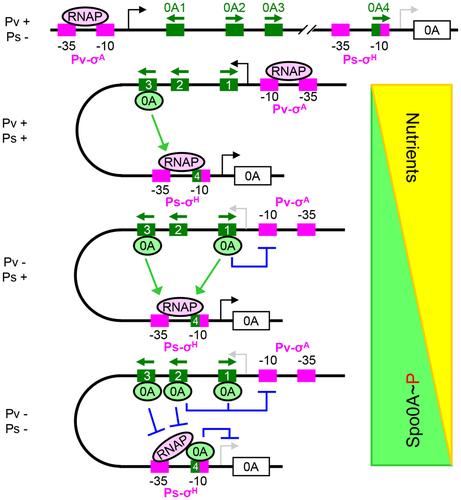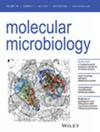主调控因子Spo0A的自动调控控制枯草芽孢杆菌细胞命运的决定
IF 2.6
2区 生物学
Q3 BIOCHEMISTRY & MOLECULAR BIOLOGY
引用次数: 0
摘要
枯草芽孢杆菌(Bacillus subtilis)的Spo0A在饥饿时被磷酸化(Spo0A~P)激活,并对一组参与生物膜形成和产孢的基因进行差异性控制。spo0A基因由两个不同的启动子转录,一个在生长过程中被σ a识别的上游启动子Pv和一个在饥饿过程中被σ h识别的下游启动子Ps,并且似乎由两个启动子之间的四个spo0A ~P结合位点(0A1-4盒子)自动调节。然而,自我调节机制及其对分化的影响仍然难以捉摸。在这里,我们确定了Spo0A~P对每个0A盒子的相对亲和力,并结合系统的0A盒子突变解剖了每个启动子。结果表明:(1)在无Spo0A~P的富营养化条件下,Pv启动子和Ps启动子分别开启和关闭;(2)在低Spo0A~P的早期饥饿条件下,Ps启动子先被0A3激活,再被0A1激活;(3)在高Spo0A~P的后期饥饿条件下,Pv启动子先被0A1抑制,然后被0A2和0A4抑制;(4)在长时间饥饿条件下,两个启动子都被所有Spo0A~P很高的0A盒沉默。我们的研究结果表明,spo0A的自动调节是实现spo0A ~P发育增加的关键决定因素之一,导致进入生物膜形成或孢子形成的时间窗口。本文章由计算机程序翻译,如有差异,请以英文原文为准。

Autoregulation of the Master Regulator Spo0A Controls Cell-Fate Decisions in Bacillus subtilis
Spo0A in Bacillus subtilis is activated by phosphorylation (Spo0A~P) upon starvation and differentially controls a set of genes involved in biofilm formation and sporulation. The spo0A gene is transcribed by two distinct promoters, a σA-recognized upstream promoter Pv during growth, and a σH-recognized downstream promoter Ps during starvation, and appears to be autoregulated by four Spo0A~P binding sites (0A1-4 boxes) localized between two promoters. However, the autoregulatory mechanisms and their impact on differentiation remain elusive. Here, we determined the relative affinity of Spo0A~P for each 0A box and dissected each promoter in combination with the systematic 0A box mutations. The data revealed that (1) the Pv and Ps promoters are on and off, respectively, under nutrient-rich conditions without Spo0A~P, (2) the Ps promoter is activated by first 0A3 and then 0A1 during early starvation with low Spo0A~P, (3) during later starvation with high Spo0A~P, the Pv promoter is repressed by first 0A1 and then 0A2 and 0A4, and (4) during prolonged starvation, both promoters are silenced by all 0A boxes with very high Spo0A~P. Our results indicate that the autoregulation of spo0A is one of the key determinants to achieve a developmental increase in Spo0A~P, leading to a temporal window for entry into biofilm formation or sporulation.
求助全文
通过发布文献求助,成功后即可免费获取论文全文。
去求助
来源期刊

Molecular Microbiology
生物-生化与分子生物学
CiteScore
7.20
自引率
5.60%
发文量
132
审稿时长
1.7 months
期刊介绍:
Molecular Microbiology, the leading primary journal in the microbial sciences, publishes molecular studies of Bacteria, Archaea, eukaryotic microorganisms, and their viruses.
Research papers should lead to a deeper understanding of the molecular principles underlying basic physiological processes or mechanisms. Appropriate topics include gene expression and regulation, pathogenicity and virulence, physiology and metabolism, synthesis of macromolecules (proteins, nucleic acids, lipids, polysaccharides, etc), cell biology and subcellular organization, membrane biogenesis and function, traffic and transport, cell-cell communication and signalling pathways, evolution and gene transfer. Articles focused on host responses (cellular or immunological) to pathogens or on microbial ecology should be directed to our sister journals Cellular Microbiology and Environmental Microbiology, respectively.
 求助内容:
求助内容: 应助结果提醒方式:
应助结果提醒方式:


